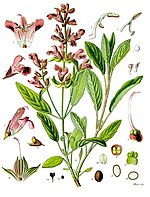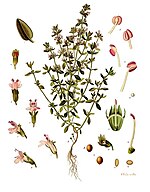Scarborough Fair
Scarborough Fair is a traditional English folk song , the author of which is unknown. Probably the best-known version today is the adaptation by Simon & Garfunkel , which first appeared in 1966 on the album Parsley, Sage, Rosemary and Thyme . The song is often sung in a duet with a woman's and a man's voice.
origin
The name can be traced back to the Middle Ages , when the northern English coastal town of Scarborough was an important meeting place for merchants from all over England. A 45-day large trade fair , called the Scarborough Fair , began there on August 15 each year and was very long for the time.
When this fair was abandoned in the 19th century, the name Scarborough Fair was given to a music festival that is now held in the same town every September.
The song was probably written in the 16th or 17th century. It is possible that it originated from the Scottish folk ballad The Elfin Knight . After it was passed down from town to town, it was changed several times. It so happens that dozens of stanzas exist today. However, mostly only a few of them are sung.
text
The song is about a former pair of lovers who now set unsolvable tasks for each other in order to become a couple again. The last stanza indicates that the task is not to be fulfilled; what counts is the attempt to face them.
| Both: | |
|
Are you going to Scarborough Fair? |
Are you going to Scarborough Market? |
| Man: | |
|
Tell her to make me a cambric shirt, |
Ask her to make me a batiste shirt, |
| Both: | |
|
Have you been to Scarborough Fair? |
Did you go to Scarborough Market? |
| Woman: | |
|
Ask him to find me an acre of land, |
Ask him to find an acre of land for me, |
| Both: | |
|
If you say that you can't, then I shall reply, |
If you say you can't, I answer: |
The refrain "Parsley, sage, rosemary and thyme"

|

|

|

|
|
Parsley ( parsley ), sage ( sage ), |
|
The refrain "Parsley, sage, rosemary and thyme" initially makes no sense for a listener of today, but has a symbolic meaning:
- Parsley used to be eaten as a digestive and was designed to remove the bitterness in food at the same time. Medieval doctors also used this plant for a spiritual purpose.
- Sage has long been considered a symbol of strength.
- Rosemary represents loyalty, love and memory. Today in England there is still the custom of many women to wear sprigs of rosemary in their hair.
- Thyme primarily symbolizes courage. At the time the song was written, knights often wore shields with a thyme plant painted on them when going into battle.
The lyrical I in the song wished with the entries to alleviate the bitterness in the relationship of these four plants clemency, fortitude, for the period in which the former couple is separated, fidelity to stay together, even if both are just alone; and also encouragement so that both can do the "impossible things" and get back together as soon as possible.
melody
The song is in the church key (mode) Doric , which is quite typical for the English songs of the late Renaissance (see Greensleeves ), but had an archaic character for the ears of the 20th century, which was beneficial for rediscovery and reuse.
Versions
A first recording of the song created the melody in the film by the use of Man Hunt of Fritz Lang (1941). In 1955, Gordon Heath and Lee Payant published a recording on their album Encores From The Abbaye , which was based on a printed sheet music edition by the English song collector and music scholar Frank Kidson (1891).
The melody version known today was coined by Simon & Garfunkel ; their recording Scarborough Fair / Canticle was released in 1966 on the album Parsley, Sage, Rosemary and Thyme . Paul Simon learned the song from Martin Carthy in London in 1965 and added the counterpoint from Canticle , a re-recording of The Side of a Hill . In 1968 the song was released as a single as a soundtrack for the film The Graduation and reached number 11 on the US charts. The copyright belongs exclusively to Paul Simon, which was a thorn in the side of Martin Carthy as he was actually the "traditional source". A reconciliation between the two only came about in 2000 when Paul Simon sang the song with Carthy at a concert in London.
There are numerous other versions of the song, most of which are limited to a selection of the stanzas mentioned above; well-known artists are:
- 6 cylinder
- Amy Nuttall
- Angelo Branduardi
- Aoi Tada (in the soundtrack of Gunslinger Girl -Il Teatrino- )
- Ataraxia
- Aurora (as the title song of the Brazilian telenovela 'Deus Salve o Rei' - God save the king)
- Bill Cunliffe (instrumental, in A Paul Simon Songbook )
- Bob Dylan (with excerpts from the folk song in his adaptation Girl from the North Country )
- Brainbox
- Bryn Terfel
- Carly Simon
- Celia Pavey (first time in The Voice (Australia) )
- Celtic woman
- Deborah Sasson
- Faun (titled Thyme and Rosemary from the album Von Den Elben )
- Frank Schöbel (under the title Come With Me To The Sea )
- Gregorian
- Harry Belafonte
- Hayley Westenra
- Helene Fischer (under the title My World )
- Herbie Hancock
- John Renbourn
- Juliane Werding (with Ulrike Sauerland) (Nadza)
- Justin Hayward
- Kristof Schreuf (with the lyrics from My Generation (The Who); 2010)
- Lana Del Rey
- Leaves' Eyes (on the 2009 album Njord )
- Loreena McKennitt
- Marianne Faithfull
- Marshall & Alexander (on the 2006 album Try To Remember )
- Martin Carthy
- Mediæval Bæbes
- Michael Völkel Instrumental version for acoustic guitar
- Midori
- My dying bride
- Nana Mouskouri
- Nolwenn Leroy
- Omnia (titled The Elven Lover )
- Paddy Schmidt
- Paola (titled An Island at World's End )
- Peggy March (titled The City in the Sea )
- Peter Herbolzheimer
- Peter Hofmann and Deborah Sasson
- Quadriga Consort
- Queensrÿche
- Roger Whittaker
- Sandie Shaw
- Santiano (titled Garden of Eden on the album Until the End of the World )
- Sarah Brightman
- Scooter (titled Scarborough Affair )
- Sérgio Mendes
- Shirley Collins & Joan Baez
- Tamaru Yamada (in the soundtrack of Shūmatsu Nani Shitemasu ka? Isogashii Desu ka? Sukutte Moratte Ii Desu ka? )
- The Gothard Sisters
- The King's Singers
- The Stone Roses (adopted melody; titled Elizabeth My Dear )
- Timmy Trumpet & TNT ( Technoboy 'n' Tuneboy ) (as hardstyle version)
- Tori Amos
- Urban Trad
- Vicky Leandros (who recorded a French, German and Greek version)
Further reception
The title of the British crime television series Rosemary & Thyme (2003-2007) is based on this song and uses an adaptation composed by Christopher Gunning as the theme music.
Web links
- The Modern Herbalist: Parsley, Sage, Rosemary and Thyme: A Love Story (English)
- Information to the song at BBC.co.uk with interviews of Martin Carthy and Paul Simon (English)
- Song history and different text versions (English)
Single receipts
- ↑ “Scarborough Fair” - Traditional / Simon and Garfunkel , History of an American folk song Kim Ruehl, About.com Guide, accessed July 11, 2013.
- ^ Film and TV Scores , on: Christopher Gunning website, accessed April 13, 2016